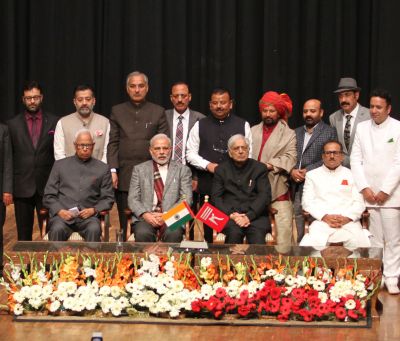SRINAGAR: It proved to be a landmark year for politics of Jammu and Kashmir as BJP strode to power in the state for the first time stitching a coalition with PDP after assembly elections last year threw up a hung house.
Another issue which dominated the political landscape was related to beef ban following a direction to police by the high court in Jammu to strictly implement a pre-Independence law on cow slaughter. The issue resonated in the Legislative Assembly for most of the autumn session.
The issue turned ugly when at least three BJP MLAs pounced on an Independent MLA from Kashmir for allegedly hosting a beef party inside MLA hostel at the peak of tensions.
There was confusion about the status of the ban as another bench of the court in Srinagar, hearing a petition against the prohibition, asked the state government to file its response on the plea for decriminalisation of bovine slaughter.
The state chose to approach the Supreme Court on the issue but the apex court directed the high court to deal with it.
A full bench of the high court, while setting aside the conflicting orders of its two benches, put the ball into government’s court asking it to address the issue.
Even as the issue was being dealt in the court, three Kashmiris travelling in a truck were attacked by a mob with a petrol bomb at Udhampur in Jammu region on October 9. One of the three persons died due to burn injuries 10 days later.
The death of the youth led to protests in the Valley, forcing the authorities to impose curfew-like restrictions for few days to maintain law and order.
PDP founder Mufti Mohammad Sayeed was sworn in as the chief minister of the state for the second time on March 1. He became only the third person to be sworn in for a second time after Ghulam Mohammad Sadiq and Farooq Abdullah — the latter having had three terms.
However, there was plenty of drama before PDP and BJP — described by Sayeed as coming together of North and South Poles — finalised the alliance in March.
It took more than two months of hectic negotiations, from December last year to end of February, between the two parties to come to a common minimum programme, officially christened ‘Agenda of Alliance’.
Besides its usual planks of self rule, revocation of the AFSPA and return of power projects to the state, the PDP leadership in its election campaign had focused on stopping BJP from coming to power in the only Muslim-majority state of the country.
With Prime Minister Narendra Modi leading the BJP charge, the party, instead of focusing on Congress, chose to hit out at the ‘dynastic politics’ in PDP and National Conference.
The alliance has not gone down well in the Kashmir Valley, the predominant support base of the PDP, with some of its senior leaders calling it a blunder to ally with BJP.
In the post-alliance scenario, Sayeed used every
opportunity throughout the year to defend his joining hands with BJP on the grounds that it was a “historic opportunity” to end the regional discord in the state.
Although former militants have been elected as MLAs and one of them went on to become a minister in the past, the year also saw former separatist leader Sajjad Gani Lone taking oath as a minister in the state government. This was a first in the 25 years of turmoil in the state.
Modi addressed a public rally here in November and announced a mega reconstruction package of Rs 80,000 crore for Jammu and Kashmir but ally PDP was left red-faced as he did not touch on much-anticipated dialogue process either with Pakistan or the separatists in the state.
In fact, Modi’s assertion at the rally that “I don’t need advice or analysis from anyone in this world on Kashmir” was seen as a major snub to Sayeed, who in his address to the rally, had advocated dialogue with Pakistan.
On the separatist front, secessionist groups got a new lease of life as they occupied the centre-stage of the India-Pakistan relations in the month of August.
The then Pakistan National Security Advisor Sartaj Aziz was to arrive in New Delhi for talks with his Indian counterpart but the meeting was cancelled as Islamabad invited separatist leaders for a meeting with Aziz.
India objected to the meeting, leading to cancellation of the talks.
On the militancy front, a new ‘homegrown’ breed of militants from south Kashmir, throwing caution to the wind, announced their arrival through social networking sites.
Led by Hizbul Mujahideen’s self-styled commander Burhan Wani, the militants, dressed in army fatigues and brandishing automatic assault rifles, posted their pictures on Facebook in an attempt to lure more youth to join their ranks.
It was a stark departure from earlier practice by the militants to keep their identity under wraps and maintain a low profile.
A security official said it was a desperate attempt by the militant groups to woo youngsters to join them as fresh ‘reinforcements’ were not arriving from across the Line of Control in view of the robust anti-infiltration grid.
The security forces had many successes against the militants in the Valley, killing 64 of them including some top commanders during the year.
However, the security forces also suffered some major losses including an officer of elite commando force Colonel Santosh Mahadik. (PTI)


